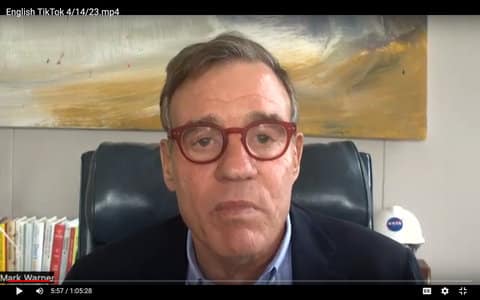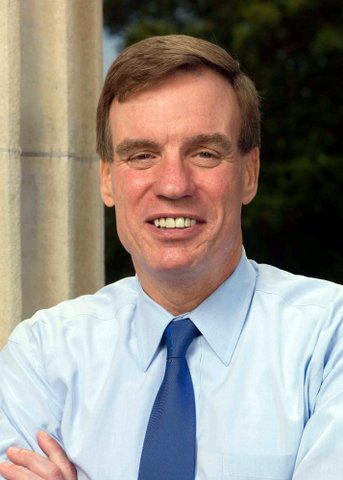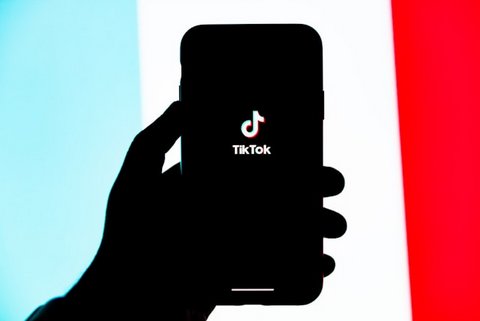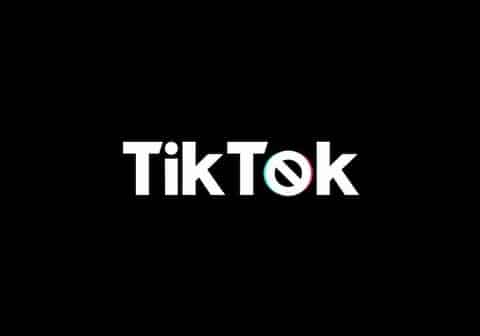
14 May Lawmaker, Human Rights Advocates Debate TikTok Ban Legislation

Sen. Mark Warner, D-Va., spoke at an Ethnic Media Services briefing after introducing legislation aimed at restricting TikTok. (Screenshot captured by Danielle Parenteau-Decker / The CC Pulse)
By Danielle Parenteau-Decker
Free speech versus national security — that’s pretty much how the current debate over whether to ban TikTok in the U.S. is being framed.
TikTok is many different things to many different people. Millions of Americans use TikTok to participate in dance challenges, learn cooking methods, promote themselves and make a living, get their news or just simply have fun. But others fear an insidious threat may be looming, prompting Ethnic Media Services to ask, “Should We Worry About What’s Behind All Those Dancing Cats?” That was the title of its April 14 national press teleconference looking at the debate from different perspectives.
TikTok has headquarters in the U.S. (Culver City, Calif., to be specific) but is owned by a Chinese company, ByteDance.
China’s National Intelligence Law could reportedly be used to require ByteDance to turn over U.S. TikTok user data if Chinese authorities asked it to.
“Chinese tech companies, they’re not obligated to their customers or their shareholders. At the end of the day, they have to be obligated to the CCP,” Sen. Mark Warner, D-Va., said at the teleconference, referring to the Chinese Communist Party.
Warner introduced a bill March 7 called the Restricting the Emergence of Security Threats that Risk Information and Communications Technology, or RESTRICT, Act.
The legislation has 25 co-sponsors: 13 Republicans, 11 Democrats and one independent.
“The bill seeks to empower the Department of Commerce to review and prohibit certain technologies where U.S. user data interacts with ‘foreign adversaries,’ ” according to TechRadar. Those adversaries are currently China, North Korea, Iran, Russia, Cuba and Venezuela.
Warner said the legislation would create a “rules-based approach” in which a tech company would “get a day in court” and the burden would be on the federal government to prove national security risk.
The senator said there were two issues that show how much of a threat TikTok poses — not just to national security but to the youth, in particular. A disproportionate number of TikTok’s many users are young people. And, he said, “children of color in America … use TikTok at an even higher level than other kids in America.”
“A lot of young people go to TikTok for their news,” Warner said, suggesting that the Chinese government might start slipping in videos that say, “ ‘Putin is right, and Ukraine is part of Russia’ or [Chinese] ‘President Xi’s aspirations to take back Taiwan, really, that should not be anybody’s business but China’s,’ ” for example.
>>>Read: Social Media Spreads Fake News, but Ethnic Media Can Fight It
“Beyond the parental concerns you might have about your kids’ data residing in a foreign country,” Warner said, “the idea that a adversarial entity, the Communist Party of China, could use this to, frankly, blackmail someone because they know your likes, I think is a very real, tangible threat, and we shouldn’t have to wait until it plays out to take it on.”
A reporter asked if it was true that TikTok could see everything people post and was spying on users.
Kate Ruane, director of U.S. free expressions programs at PEN America, said it was true but not only true of TikTok.
“Every platform can see everything you post,” if you’re not using end-to-end encryption, she said. “So yes it is true, but it is a much bigger problem than TikTok as far as I know.”
After TikTok CEO Shou Zi Chew testified before Congress in March, lawmakers faced “criticism these are all Neanderthal Troglodyte members of Congress that don’t understand anything about technology,” said Warner.
He tried to distance himself from those members.
“I’m a tech guy,” said the 68-year-old senator, who co-founded Nextel. “I strongly believe in the positive power of technology.”
But that was not the only glaring issue at the hearing.
“When we looked at the TikTok hearing, we were very, very troubled,” said John C. Yang, president and executive director of Asian Americans Advancing Justice | AAJC.
Most troubling, he said, was the “specific targeting of Mr. Chew, saying that he must be an emissary or an agent for the Chinese government” despite the fact Chew is not Chinese but Singaporean.
Some of the legislators wanted to be “seen as so-called tough on China or hard on China with no link to the actual issues presented by TikTok,” Yang said.
He said there are issues around data privacy, data transfer and how the algorithm works, but “many of these issue, perhaps most of these issues, are true of all social media platforms.”
Yang said the focus on TikTok has been framed as “American values and American privacy versus some foreign interest.”
He also said, “When we have had these types of geopolitical tensions with a foreign country in Asia, there is a backlash that is suffered by Asian Americans here in the United States.”
Warner tried to make it clear that the adversaries are those countries’ governments, not their citizens.
“My beef is with [the CCP and Chinese President Xi Jinping]. It is not with the Chinese people. It is not with the Chinese diaspora. It is not with Asian Americans, Chinese Americans,” he said.
By not making that distinction clear, he continued, you’re “playing directly into the CCP’s propaganda because then they can say to the Chinese diaspora around the world, ‘You see, America is just anti-Chinese.’ ”
Another hot-button issue at the center of this debate is the potential impact on free speech.
Sixteen civil liberties organizations led by PEN America sent a letter to Congress “expressing our collective opposition to a ban on the app without first considering less drastic alternatives and the implications of such a ban for free expression,” Ruane said, “even though we fully acknowledge that TikTok may pose risks for privacy and security.”
She warned of the effect that banning TikTok could have on how young people view the government.
“For … the tens of millions of young Americans who use TikTok,” Ruane said, “to witness a popular social media platform summarily shut down by the government will raise serious questions in the minds of a rising generation about the sanctity of free speech in this country.”
>>>Read: Is TikTok Out of Time? Teens Have Their Say
Despite the concerns Ruane laid out, PEN America has neither opposed nor supported the RESTRICT Act.
“We see it as a good-faith attempt at reaching a middle ground,” she said. “However, we are concerned with the breadth and vagueness of the authority it would grant to the president and the Commerce Department.”
She suggested “a comprehensive consumer privacy bill” as an alternative.
“A robust privacy bill could address concerns not just at TikTok but across the multiple social media platforms that have proven to be vulnerable to intrusion by the CCP and other foreign governments,” Ruane said. “It could also mitigate concerns of not just foreign data mining but also hacking, ransomware and other security vulnerabilities.”
Since being introduced in the Senate, the RESTRICT Act has been read twice and referred to the Committee on Commerce, Science and Transportation. Like other legislation, it would need to pass the Senate and House and be signed by the president to become law.






No Comments